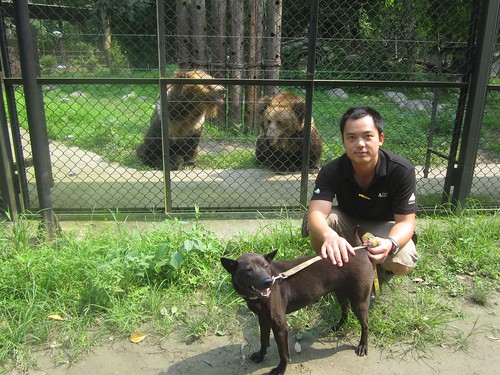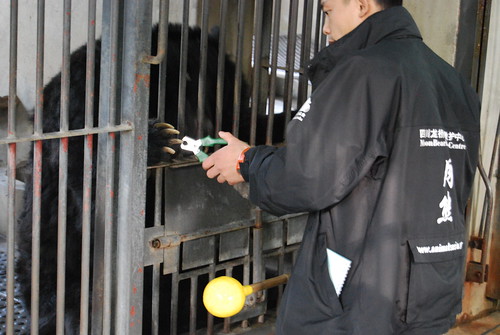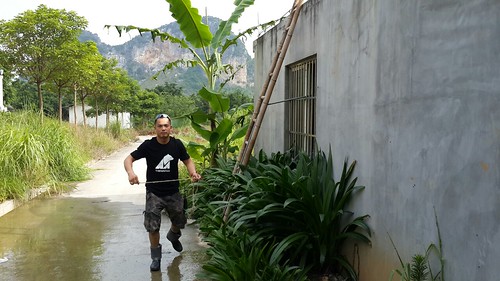Sanctuary Stars: Read Rocky’s perfect explanation of bear “enrichment”
23 June 2016
Why giving enrichment to bears is like giving toys to babies, the joy of making bear swings and why Rocky won’t stop fighting till bear bile farming ends.
Name: Xueliang Shi AKA Rocky
Position: Assistant Bear Manager
How long have you been with Animals Asia? 14 years
Location: China Bear Rescue Centre, Chengdu
Please describe your career with Animals Asia to date. What were you doing before?
Before I came to work here, I worked as an interior decorator and as an electrician. In 2002 I started out as a bear worker and by 2007 I had been promoted to Bear Team Supervisor. Then two years ago I became the Assistant Bear Manager.
You oversee the enrichment for bears. Please explain what enrichment is and why it is so important.
Personally I see it as like giving toys to babies. Babies or children are usually interested in or feel curious about new things. Toys can stimulate them to think, develop their spirit of exploration, and make them smile and feel happy. Without them they will get bored and won’t know what to do.
Likewise, it’s not good for child development if they rely too much on their parents. Toys can help develop kids’ intelligence and thinking and build up their bodies. Toys can make their life more colorful so they won’t feel bored. To have kids grow up healthily, it is important for them to have the companionship of their parents, but toys are also indispensable.
This is similar to bears. Enrichment can improve their life quality when they are in captive settings. It can improve their behaviors, and guide them to use their energy in a positive way.
A wild bear usually spends most of their time foraging. However, space at our bear houses is limited. So by using enrichment and finding ways to hide their food we can help prolong the amount of time they spend foraging. They can live like a wild bear from that aspect. A wild bear will rest or sleep after foraging. It is also important to offer a peaceful and quiet resting place for them.
Can you tell me one piece of enrichment that the bears particularly love?
They particularly love sweet items like jam and condensed milk. As for enrichment toys, bears love the fire hose hammock and the tyre swings.
As someone who knows the importance of enrichment - can you begin to imagine how bears survive in such tiny cages without even being able to move for so long?
I can imagine that hopeless and boring life with pain, fear and hunger. If I was stuck in a confined room, I would go mad. And it’s not just mental - for them to stay in such tiny cages where they even can’t turn around. Muscle soon disappears without exercise.
Do you get the chance to watch the bears enjoy the enrichment? How does it feel to see them happy in the sunshine, knowing what they have been through?
In my career here I have particularly loved watching the bears enjoy the enrichment I have designed – including the swings. When seeing the bears relaxing on it or playing with it in pairs, I feel very happy. They went through so much suffering and, thanks to God’s mercy, they came to our rescue centre.
What has Animals Asia taught you about animals?
I have learnt so much working here. I’ve learnt that animals deserve to be treated nicely and kindly too. For example, I have had dogs but I never really knew how to look after them properly until I worked here. I had to learn about the importance of regular walks and diet.
I know now. Now I even wash food cans out before throwing them away because I worry that animals might want to eat the food left inside and the sharp edge might hurt them. That wouldn’t have even crossed my mind before.
Anything else you want to add?
What we are doing at our rescue centre is the bears’ hope. We will keep fighting until bear bile farming ends. Although our centre can never be the same as their natural habitat, it’s a big improvement compared to those rusty tiny cages they lived in for so many years on bile farms.
BACK








 Healing the hidden wounds
Healing the hidden wounds
 Early summer awakening at the China Bear Rescue Centre
Early summer awakening at the China Bear Rescue Centre
 5 reasons the dog meat trade must end
5 reasons the dog meat trade must end